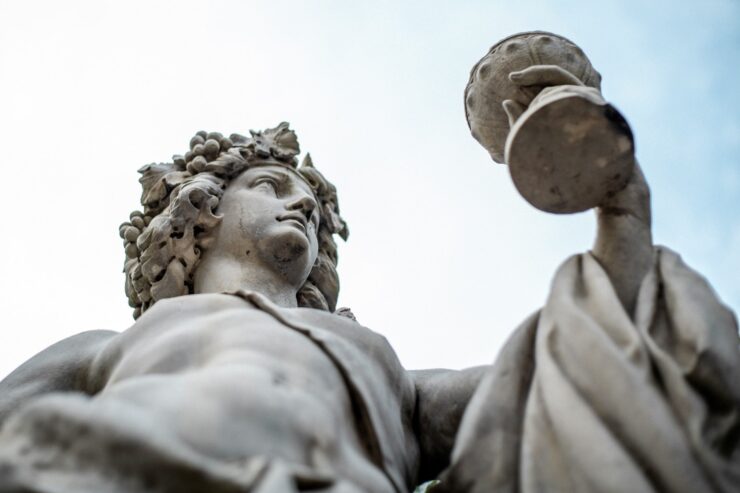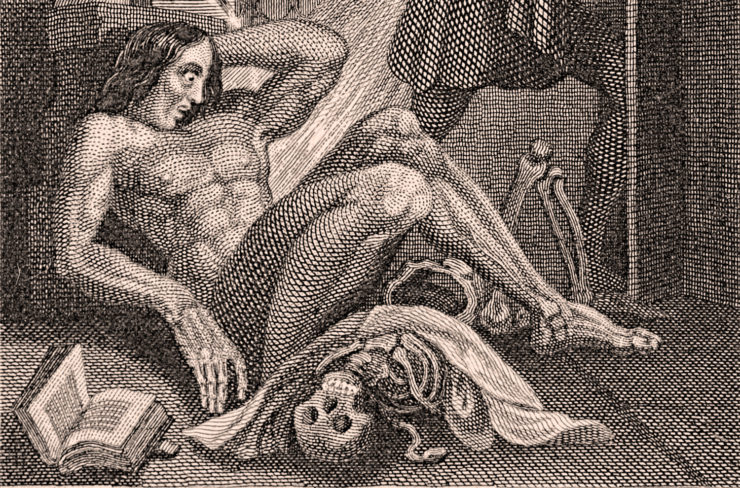As a lapsed Episcopalian-turned-agnostic who grew up on science fiction and superhero comics, I’ve spent a fair amount of time thinking about the divine. Spend enough time in the uncanny corners of fiction, though, and the definition of what constitutes the divine starts to look a little different. Some writers I’ve spent decades reading have spent the bulk of their career exploring nontraditional concepts of divinity and omnipotence—I feel reasonably sure that I could put together a list like this featuring only works by Neil Gaiman, to cite one example.
There’s also a way in which the fantastical can wrestle with big questions about divinity, immortality, and omnipotence in ways both unexpected and irreverent. Sometimes that comes as an outgrowth of exploring the rituals and dogma of an existing religion—consider the ways someone like James Morrow or James P. Blaylock takes aspects of Christianity and turns it into thought-provoking speculative fiction that’s unlikely to be taught in a Sunday School class. Sometimes it involves imagining a forgotten deity, or a long-dead one, or one capable of bringing eldritch horrors to bear upon the world.
So here’s a look at five books with strange gods and strange concepts of gods. Whatever your own personal cosmology might be, hopefully you’ll find something to spark inspiration in these words.
Dead Country by Max Gladstone
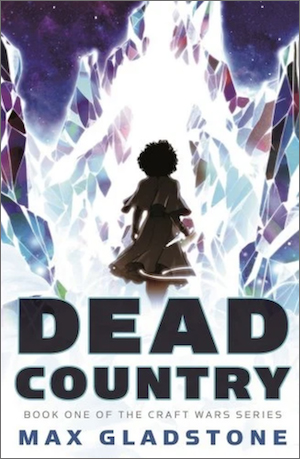
There are plenty of reasons to find Max Gladstone’s Craft novels—the six volumes of the Craft Sequence, as well as the Craft Wars series that’s officially underway with Dead Country—appealing. Some of those have to do with the characters; others have to do with the setting, which feels sprawling and alive in a way few other books do. But there’s also the way that Gladstone deals with magic and divinity in these books, and that’s where things get especially intriguing.
The use of magic here feels more like law than anything else: a series of arrangements and agreements, one where a successful practitioner can think on the fly, with transformative effects. As for the gods in these books, well — are you familiar with Abraham Bosse’s frontispiece for Thomas Hobbes’s Leviathan? The one with a giant figure made up of a whole bunch of smaller figures; a kind of diagram of society as literally made up of the members of that society? That’s not far removed from what Gladstone is going for here, and if you think that that might pave the way for some grand storytelling opportunities, you’d be spot-on. Having established this as one of the central parts of these books’ setting, Gladstone then explores how gods’ rise and fall could affect the people around them — and what sort of beings might put the gods themselves at risk.
Viscera by Gabrielle Squalia
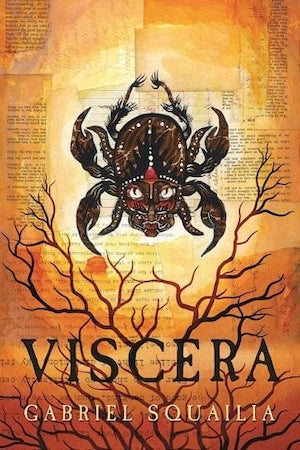
Sometimes the right recommendation in the right place can have a huge impact. Years ago on a visit to Seattle, I stopped by Elliott Bay Book Company in Seattle, where I learned long ago that the staff picks are well worth heeding. It was while browsing the SFF section that the cover of Gabrielle Squalia’s Viscera caught my eyes, and soon enough I’d picked up a copy and gotten hooked.
There are gods aplenty in Squalia’s novel, but here’s the thing: they’re all dead. And for the characters in this novel, harvesting their remains brings with it the gateway to euphoric experiences. In other words, yes, this is a novel set in a fantasy world in which the illicit drug of choice is made from the decomposing corpses of deceased deities. It’s probably worth mentioning here that this is in no way the strangest element of Squalia’s novel, which abounds with memorable characters, odd alliances, and stunning imagery.
Settling the World: Selected Stories 1970-2020 by M. John Harrison
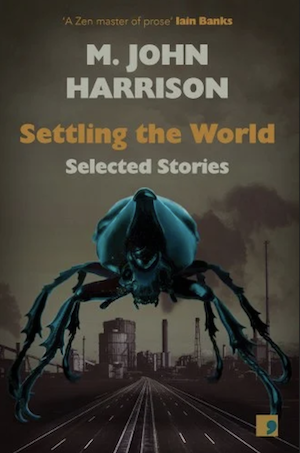
I’m a bit of a latecomer to M. John Harrison’s work; I read The Course of the Heart for the first time years ago, when I don’t think I was quite ready for it. Years later, I ended up reading a whole lot of Harrison’s work for a long article on his fiction; this time, I was ready. The title story of the retrospective collection Settling the World is a kind of breakneck journey into the unknown, one that has more than a little espionage fiction in its DNA.
That’s not all it has, though. Here’s the story’s first sentence: “With the discovery of God on the far side of the Moon, and the subsequent gigantic and hazardous towing operation that brought Him back to start His reign anew, there began on Earth, as one might assume, a period of far-reaching change.” I’m not sure M. John Harrison is given to mic drops, but I like to imagine him doing precisely that upon finishing that sentence. From there, the story takes on aspects of a thriller, as its protagonist is assigned to investigate a stretch of road known as God’s Motorway — and becomes embroiled in a spy thriller plot with the added element of an unknowable deity looming above the proceedings.
The City We Became by N.K. Jemisin
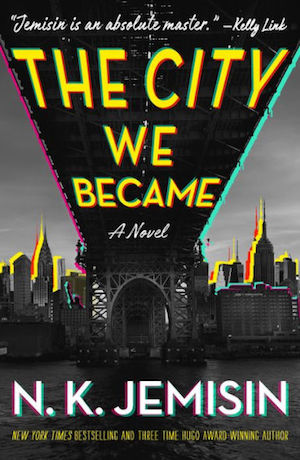
Speaking of writers whose work comes at questions of divinity from different angles, I think it’s safe to say that N.K. Jemisin also falls into this category. Whether it’s the palace intrigue-plus-gods aspects of The Inheritance Trilogy or the the concern with world-changing powers and sprawling lifespans in the Broken Earth novels, Jemisin’s bibliography suggests that she’s thought a lot about some of the grandest questions that theologians have posed over the years — and finds fascinating ways to incorporate them into her work.
The City We Became offers a very different spin on these concepts, though it’s also rooted in grand questions about humanity, society, and higher powers. In this case, those higher powers are people granted a kind of divinity by the places that they live—which puts them into conflict with agents of a repressive eldritch power looking to leave its mark on Earth. Think local gods, who can stand together or skirmish, depending on the circumstances; the result is a concept at once classical and contemporary.
Revelator by Daryl Gregory
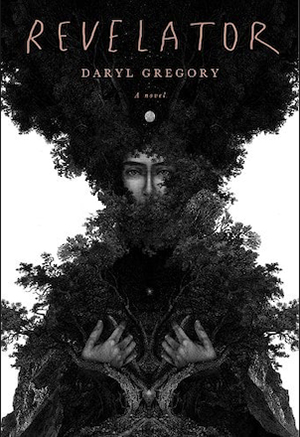
There’s a lot about Daryl Gregory’s Revelator that feels wrought from history. It’s set in Prohibition-era Tennessee, and follows the life of a young woman at odds with her family’s strict religion and said family’s deeply-buried secrets. It’s when Gregory gets into the nature of that religion that things get significantly stranger, as one family’s idiosyncratic belief system turns out to have its roots in something uncanny.
The presence of Revelator on this list gives you a pretty good indication of what’s at the root of those beliefs. But the being that dwells there, the Ghostdaddy, pulls off the impressive feat of feeling both compellingly divine and fundamentally alien. And it’s there, too, that Gregory gets at a question that theologians and cosmic horror writers alike have reckoned with: what does it mean if a divine intelligence was fundamentally beyond our comprehension?
Tobias Carroll is the managing editor of Vol.1 Brooklyn. He is the author of the short story collection Transitory (Civil Coping Mechanisms) and the novel Reel (Rare Bird Books).










